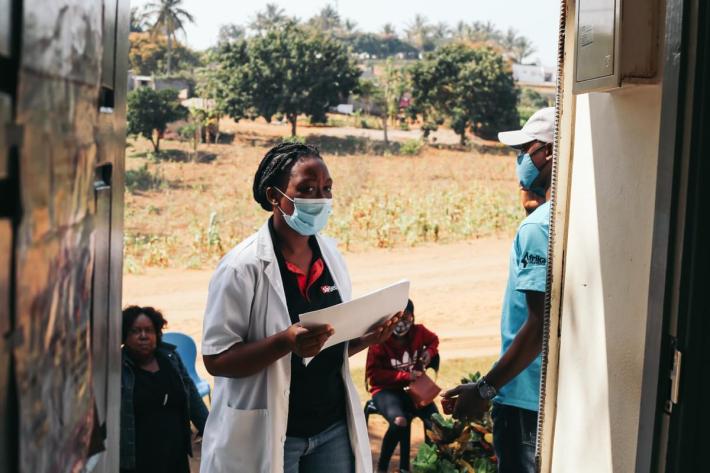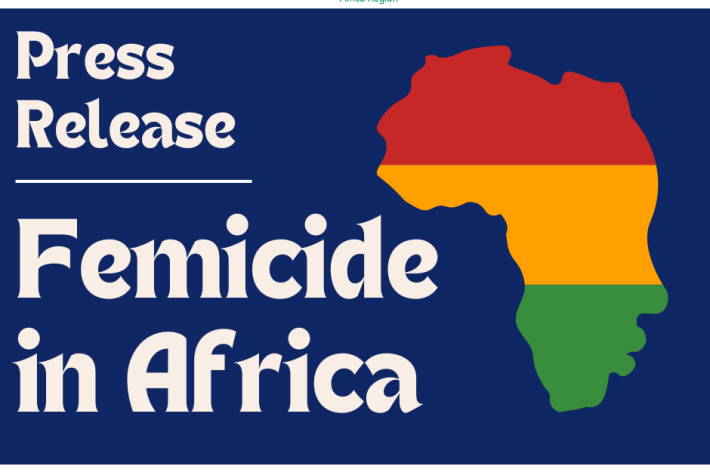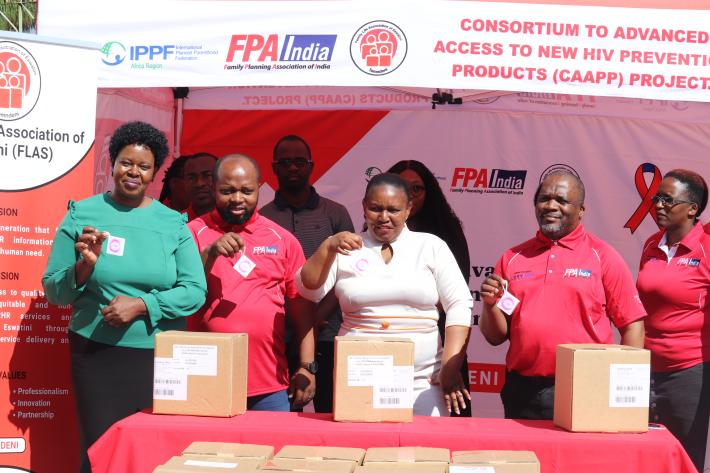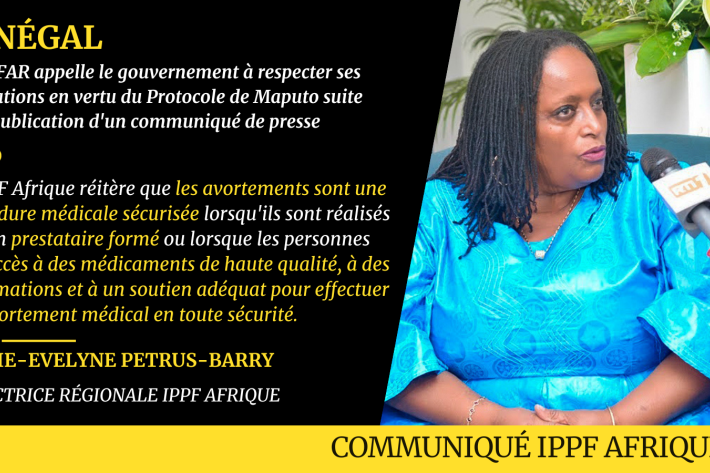Latest press releases
A selection of stories from across the Federation
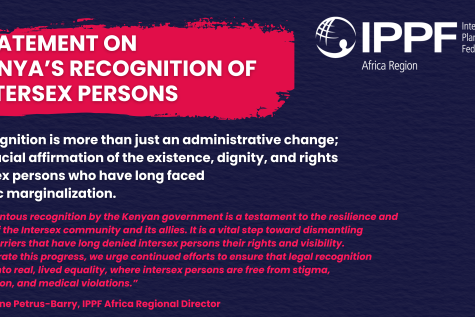
Kenya
IPPF Africa Region Welcomes Kenya’s Landmark Recognition of Intersex Persons
IPPF Africa Region Welcomes Kenya’s Landmark Recognition of Intersex Persons Nairobi, Kenya: 13 February 2025 – On 31 January 2025, Kenya has taken a groundbreaking step towards inclusivity and human rights by officially recognizing intersex as a sex marker alongside male and female in the Kenya Legal Notice 153 of 2025.


| 28 July 2022
Guinea: Horrific cases of rape and murder of girls must urge authorities to strengthen their efforts to prevent and combat sexual violence
Guinean authorities must take immediate measures to ensure thorough and impartial investigation of recent rapes and sexual assaults followed by murders committed over the course of just eight days and bring perpetrators to justice, Amnesty International and the International Planned Parenthood Federation (IPPF) said today. They must also increase their efforts to fight sexual violence by strengthening prevention, supporting access to justice for survivors and adopting a special law on violence against women. Six girls aged between three and 16, and a woman were sexually assaulted, and some were raped between 25 November and 2 December 2021. Two of the girls have died as a result of the violence. “Rape is all too commonplace in Guinea. Authorities should urgently strengthen their efforts to prevent and combat sexual violence in Guinea," said Samira Daoud, Amnesty International West and Central Africa director. Rape of girls On 2 December 2021, the Office for the Protection of Gender, Childhood and Morals (OPROGEM) presented a 24-year-old man charged with the rape of a three-year-old girl in the district of Gbessia in the capital Conakry. On 30 November another three-year-old girl was raped in Batè-Nafadji in the eastern region of Kankan. On 27 November, a 12-year-old girl was raped by two men on her way home in the town of Sanoun. This came just a day after the death of another 12-year-old girl in the north-eastern town of Siguiri. In the urban commune of Labé, west-central region of Guinea, a three-year-old girl was gang raped on 26 November. Local organization, "Agir pour le Droit Féminin", which met with the three-year-old girl's parents on 7 December, told the organizations that she was abducted when going to buy candy not far from the family home. She was then taken to an uninhabited house and sexually assaulted until she died. The girl’s father who met with the prosecutor confirmed his demand for justice for his daughter. One of the alleged perpetrator’s father requested forgiveness from the girl’s family but they refused. The rapes of girls followed the rape of a woman on 25 November while she was in a hospital in the north-western town of Kamsar for a surgery. The hospital management announced three days later they had "arrested the alleged perpetrator" -who is an external service provider- and taken him to the gendarmerie. The same day, a 16-year-old girl was also raped by several men in Kankan. “The authorities must ensure thorough and impartial investigations of these rape cases without delay and anyone found guilty must be brought to justice," said Marie-Evelyne Petrus-Barry, IPPF Africa Regional Director. “Survivors must receive access to medical care and psychosocial support as well as legal aid to access justice and redress.” More than 331 rape cases reported since the beginning of the year Since the beginning of the year, OPROGEM and the Special Brigade for the Protection of Vulnerable Persons (BSPPV in French) have already dealt with 331 rape cases. In 2020 alone, they dealt with 374 cases, a number which reflects only the tip of the iceberg according to NGOs working on sexual violence survivors, journalists, police and gendarmerie. This is due to the stigma associated with rape in Guinea, which often leads to not reporting the crime and not filing complaints, and often such cases are handled through mediation and out-of-court settlements between the victims or their families and the alleged perpetrators or their families. The recent rape cases follow another case that sparked a strong public reaction across the country last month. M’Mah Sylla, a 25-year-old woman, was allegedly raped by doctors at a non-licensed clinic in Conakry, where she went for treatment. She got pregnant as a result, and the same perpetrators raped her again when she returned to the clinic to seek an abortion. The rape caused injuries that could not be healed despite seven surgeries. The victim died on 20 November in Tunis (Tunisia) where she was medically evacuated following a government intervention. Following M’Mah Sylla’s death, women staged protests on 22, 24 and 30 November in the towns of Labé, Kindia and N’Zérékoré, demanding justice for all victims of rape. On 21 November, the Ministry of Justice said three of the four alleged perpetrators of M’Mah Sylla’s rape had been detained in Conakry prison. The government also presented its condolences to her family on behalf of the head of state. Activists spoke out on the surge in rape cases. Djenab Boiro of “Mon Enfant, Ma vie” a local organization, told Amnesty International during a meeting in Conakry: “Even dead, M'Mah Sylla deserves justice. I am convinced that the day the perpetrators will be sentenced to the punishment they deserve, her soul will finally rest in peace. We have had too many cases like M'Mah Sylla’s and we hope and dream of not having any more.” “Authorities have taken some steps in the right direction in recent years which we welcome, such as the creation in 2020 of a special unit within the gendarmerie to fight sexual violence. In addition, local women’s rights organizations have played and continue to play a major role in speaking up against sexual violence, together with some media,” said Samira Daoud "Despite this situation, the persistence of rape cases, especially of girls, calls for much greater efforts to raise awareness among the public to prevent sexual violence, to protect the survivors, and ensure their timely access to justice and reparations as well as to bring perpetrators to account. This includes but is not limited to the adoption of a special law on violence against women, as recommended by the CEDAW Committee,” concluded Marie-Evelyne Petrus-Barry. Read this article in French here. To arrange an interview, please contact: Amnesty’s Press Office Email [email protected]; West and Centra Africa’s Twitter: @AmnestyWaro; and/or IPPF Africa Region Lead Communication Advisor, Mr. Mahmoud Garga ([email protected])

| 28 July 2022
Abortion hearings: What’s going on in Namibia?
Namibia is under the spotlight this month as it resumes public hearings on abortion on 16 January. This follows the hearings which took place late last year, and will hopefully play an important role in the liberalization of abortion laws in the country. The current laws regulating abortion are no longer fit for purpose – not least because the Abortion and Sterilisation Act of 1975 was adopted under apartheid South African rule and has since been repealed in South Africa. The Act currently permits abortion only in very limited circumstances, and imposes criminal penalties on women who obtain and those who perform abortions outside of this limited scope. Those who can afford it are forced to travel to South Africa for abortion care, but this option is out of reach for many women. The law, therefore, impacts far more heavily on poor and black women, perpetuating the cycle of poverty and reinforcing injustices. In 2020, 62,000 Namibians signed a petition calling for the liberalization of abortion laws, so there is certainly public backing for progress. The upcoming hearings are a key opportunity to make positive changes in the lives of all women, regardless of religious beliefs, age, race, and socioeconomic status.

| 28 July 2022
Namibia: High Court rules against same-sex couples fighting for recognition of their marriages
The IPPF Africa region is concerned by the Namibian High Court ruling on the application of non-Namibian same-sex spouses to live and work in the country. It is the latest legal battle to push for equal rights in the country. According to the High Court’s judge, Hannelie Prinsloo, the legal decision was based on an outdated law preventing the LGBTI+ community from enjoying equal human rights across the country. IPPFAR strongly encourages African Governments to review and adapt outdated laws to reflect today’s societal realities ensuring the full enjoyment of human rights for all.

| 28 July 2022
Angola Decriminalizes Same-Sex Relations
The International Planned Parenthood Federation (IPPF) welcomes the news of Angola decriminalizing same sex relationships. IPPF recognizes and congratulates activists, advocates and organizations that helped make this historic change in the law possible. On Thursday 10 February, Angola’s new penal code came into force, which decriminalized same-sex relations. It also introduces sexual orientation protections into some of Angola’s non-discrimination clauses and mentions sexual orientation in the hate speech clauses of the penal code. Angolans of all sexual orientations can finally live more freely and enjoy the same constitutional right to love and bodily autonomy. These changes are the first rewriting of colonial-era laws since Angola gained independence in 1975, which removed colonial-era clauses that have been in effect since the penal code introduced a ban in 1886. IPPF Africa Regional Office Director Marie-Evelyne Petrus-Barry stated: “The news coming from Angola breathes new life and gives renewed hope not only for the LGBTI community in Angola but Africa as a whole. The colonial-era anti-LGBTI laws have been a stain on our collective conscience, and this ruling marks a new era of inclusivity, hope and love. No one should be treated as a criminal for choosing who to love, and we hope this change in the law inspires other countries that have a similar colonial hangover to review their own laws.” The first step to change the penal code was announced in 2019, when the Parliament approved the proposed changes. However, only in November 2020 was it signed by President João Lourenço, with a 90 days delay until it came into force last week. The new penal code overturned the language of “vice against nature”, which was understood as a ban on same-sex relations. The new law includes several articles protecting against discrimination based on sexual orientation, in relation to work or at public places and events, and includes imprisonment of up to two years for discrimination based on sexual orientation. After the decriminalization in Angola, the number of countries where homosexuality is decriminalized is now 72. This is a solid foundation for the work that lies ahead to enable a world where all people can make decisions about their sexuality and well-being free of discrimination, a fight that IPPF will be active in. Read this statement in Portuguese.

| 28 July 2022
PPFAR Statement on Universal Health Coverage (UHC) day
12 December 2020. Today, the International Planned Parenthood Federation (IPPF) Africa Region joins the rest of the world in celebrating the Universal Health Coverage (UHC) day. The goal of UHC is to ensure that all people have access to high-quality health services without suffering financial hardship. A critical step to achieving this goal is the full realization of people’s access to sexual and reproductive health and rights (SRHR) and more so, among women and girls. Owing to their unique needs and vulnerabilities, the success of UHC cannot be fully achieved until all women and girls can access the sexual reproductive health services they need. Each day, more than 800 women die from preventable causes related to pregnancy and childbirth. According to the World Health Organization, 94% of all maternal deaths occur in low and lower middle-income countries. 218 million women in these countries have an unmet need for modern contraception according to the Guttmacher Institute, which also states that 35 million women have abortions in unsafe conditions. A further 133 million do not receive the treatment they need for chlamydia, gonorrhoea, syphilis and trichomoniasis. Cervical cancer, which is the fourth most common cancer among women globally is also a great challenge, with nearly 90% of the 311,000 deaths worldwide in 2018 occurring in these countries. These figures highlight the profound need to invest more in SRHR. Lack of high-quality sexual and reproductive health care undoubtedly puts women at risk for negative reproductive health outcomes. Weak health outcomes are strongly interrelated with gender inequalities, discrimination, violence and lack of SRHR information and services. It is therefore paramount that SRHR is integrated into UHC to protect gains and accelerate progress towards various goals, including the Sustainable Development Goals (SDGs). The integration of SRHR into UHC requires addressing the multiple legal and sociocultural barriers that limit access to services and prevent women and girls from fulfilling their right to health. While governments are responsible for determining their own path towards UHC, this must be done in an accordance with agreed human rights treaties and commitments, including respecting and promoting SRHR. IPPF Africa Region is committed to addressing the challenges that impede the achievement of UHC, with particular focus on those pertaining to SRHR. On this day, we implore all African governments, donors and partners to call for greater investment in SRHR, and ensure that a comprehensive package of SRHR interventions is a fundamental part of national UHC policies, strategies and programmes. Connect with us on Facebook, Twitter and Instagram. Media Contacts: Maryanne Wanyama, Communications Officer, IPPFARO, Nairobi (Kenya) - Email: [email protected]

| 28 July 2022
IPPFAR Statement on International Safe Abortion Day 2020
Nairobi, 28 September 2020. Today, International Planned Parenthood Federation Africa Region (IPPFAR) joins the rest of the world in celebrating the International Safe Abortion Day under the theme: “Telemedicine, self-managed abortion and access to safe abortion in the context of COVID-19 pandemic”. According to WHO and Guttmacher, at least 25 million unsafe abortions occurred every year between 2010 and 2014. Majority (97%) of these were in developing countries in Africa, Asia and Latin America. This is a major public health concern in these parts of the world where restrictive abortion laws and policies are the norm, resulting in preventable maternal deaths due to rampant incidences of unsafe abortion. Yet, restricting a woman’s ability to choose to end an unwanted pregnancy is a violation of her human rights. The unprecedented COVID-19 situation has severely impacted access to safe abortion in countries where favourable policies exist. With stretched health systems, diversion of resources to the COVID-19 response, disruptions in commodity supplies (including contraceptive products) and limited access to services, women's needs for sexual and reproductive health care, including contraception and safe abortion have been greatly affected. At IPPFAR, through our Member Associations, we are innovating with new service delivery models of telemedicine and self-care approaches that address women and girls’ contraception and safe abortion needs in this era of the pandemic. For example, our IPPF MA in Togo began booking clients and providing services through a toll-free teleconsultation service, which has facilitated clients’ access to services when they face challenges travelling to clinics owing to movement restrictions. The approach has further eased client flow in clinics at this time of social distancing. Additionally, the youth friendly ‘InfoAdoJeunes’ mobile application continues to provide information and remote counselling services for young people. The extensive usage of social media and other digital platforms, for example, in Cameroon, Kenya, Guinea, Ethiopia, and Togo have been effective in disseminating information about abortion and contraception, and to advertise other services available at the clinics. As the world celebrates this day, we call on African governments to domesticate, disseminate and implement provisions of the African Union Protocol to the African Charter on Human and People’s Rights on the Rights of Women in Africa. Commonly known as the Maputo Protocol, this instrument remains one of the most progressive legal instruments providing a comprehensive set of human rights for African women. We also call on other member states who have not signed nor ratified to do so. IPPFAR and its Member Associations recommit to provide safe abortion services where permissible by law. Media Contacts: -Maryanne Wanyama, IPPFARO, Nairobi (Kenya) – Email: [email protected] -Sam Ntelamo, Resident Representative, International Planned Parenthood Federation, Liaison Office to the African Union & UNECA, Addis Ababa (Ethiopia) – Phone: +251 (11) 667 0699/0761 - Mobile +251 (0) 944 73 2051- Email: [email protected]
Pagination
- First page
- Previous page
- …
- 6
- 7
- 8
- …
- Next page
- Last page











